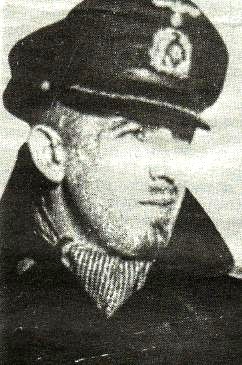
Wilhelm Zahn, captain of the U-boat, U-56
Often when we read about the Second World War, we hear of the great leaders and generals such as Adolt Hitler, Wiston Churchill, Joseph Stalin, Gregory Zhukov, Karl Dönitz, and the Desert Fox, Field Marshal Erwin Rommel. We hear of their great wars and battles, either in diplomacy or in the field of battle. However, rarely if at all do we hear of the little guys, the men who really made and lost the battles of the war. Not just any battles, but those which could have had world-changing consequences. One of those men was Wilhelm Zahn, the captain of the German U-boat, U-56. Zahn is largely unsung in today's times, however, Zahn is unique, as he was close to changing the course of history.
Around 10 A.M. in the morning of 30 October 1939, U-boat commander Wilhelm Zahn stealthily passed through a fleet of ten British destroyers and the battle cruiser HMS Hood, protecting the Home Fleet of the British Isles. Just west of Orkney, lay the HMS Nelson and HMS Rodney, two of the largest ships in the Royal Navy at the time. On-board the Nelson unaware, were First Lord of the Admiralty Winston Churchill, Admiral of the Fleet Sir Charles Forbes, and Admiral Sir Dudley Pound, First Sea Lord of the Royal Navy. In front of Wilhelm Zahn was the chance to strike a devastating blow to the British Empire, and rob it of its most powerful men.
For Zahn, Churchill's presence was unknown to him. Chuchill had convened at sea to speak of the future of the Royal Navy after the deaths of 833 servicemen during the sinking of the HMS Royal Oak by another U-boat just two prior. Though the odds were deemed impossible given the large number of warships in the area, such an opportunity to take out several major British warships could not be passed by. Zahn thus moved ahead with his goal to strike a blow to the Royal Navy by any means necessary. Laying in wait, the U-56 waited for the Nelson to cross its line of sight, and when it came within just 800 meters of the U-boat's position, Zahn struck.
Zahn's U-boat fired three torpedoes at the Nelson. All three struck the ship; only one exploded. The last torpedo only caused minor damage, and alerted the British crewmen to the presence of a U-boat in the waters. With no more torpedoes to fire, and the British on to them, Zahn ordered his vessel deeper into the water to avoid depth charges, himself sinking into a deep depression. It was only after this that Zahn realized that Churchill was on-board the Nelson, and he had missed the greatest opportunity in his lifetime. Zahn would later become known as "Man who almost killed Churchill" amongst his fellow U-boat submariners. Though the rest is history, one can only ask, what if Zahn was able to successfully sink the Nelson and kill Churchill? How would history be defined? How would history be written?
Point of divergence[]
On 30 October 1939, Wilhelm Zahn's U-boat manages to successfully sink the HMS Nelson, killing all three of the British officials on-board, and shaking the very foundation of the British government, military, and people. With the death of Churchill and its two most important naval leaders, the British are handed a powerful blow to morale. The death of three of its most senior officials just two weeks after the sinking of a British warship in which 833 men were killed, weakens British resolve for the rest of the war. Without Churchill and his passionate speeches and morale-rising presence in the city of London, the British are both unable to rally their nation together against the onslaught of Nazi Germany, nor able to bring the United States into the war following Churchill's groundbreaking address to the United States Congress on 26 December 1941.
With the loss of such important men and one of the most powerful warships in the world at the time, the image of unity and resolve in the face of terror is shattered. The British are not safe on land nor at sea. If the Germans could bypass the Home Fleet and sink the flagship of the Royal Navy, then they could do more than kill a group of senior officials if they so wished. Though Wiston Churchill never becomes Prime Minister of Great Britain, the damage is done. With the death of Sir Dudley Pound, the British campaign during the Battle of the Atlantic, is never as successful, and U-boat continue to prowl the high seas sinking cargo ships bound for Great Britain. The island nation is starved of vital war material, and the British air force finds itself short of supplies, weakening it during the Battle for Britain.
With less support from the United States thanks to to Churchill, as well as his successful Lend-Lease agreement with the Americans, the British navy does not recover as quickly. With both the Royal Air Force and Royal Navy fatally starved of American material support, the Germans successful roll over the British forces during the war, taking out the RAF first, and then bombing the Royal Navy from the skies, opening up the path to a plausible Operation Sea Lion. With the Royal Navy out of the way or incapable of mounting a successful counter to the German invasion thanks to the Luftwaffe's bombing raids on its ships, the smaller Germany Kriegsmarine is able to get German forces across the English Channel, opening a whole new front to the war on the British Isles. The course of the war is changed forever, and Nazi Germany is brought one step closer to its goals of domination.
